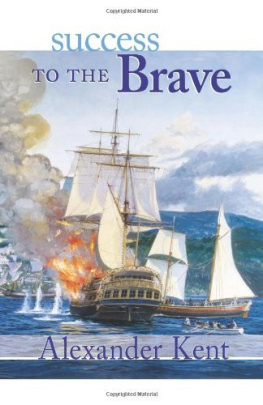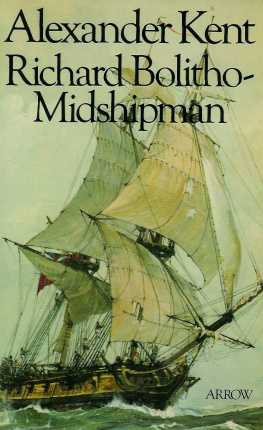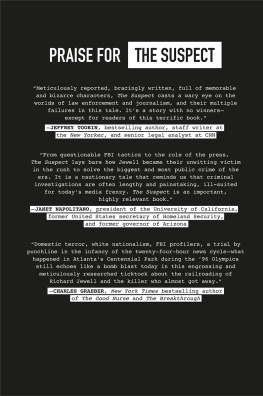Alexander Kent
Relentless Pursuit
(Bolitho 27)
For you, Kim,
With all my love, and a yellow rose
The sheets were frozen hard, and they cut the naked hand;
The decks were like a slide, where a seaman scarce could stand
But all I could think of in the darkness and the cold
Was just that I was leaving home and my folks were growing old.
Robert Louis Stevenson
from Christmas at Sea
PLYMOUTH, always one of England 's most important and strategically situated seaports, seemed strangely quiet, subdued. Even Plymouth Sound, notorious for its fast tides and unexpectedly fierce squalls, was almost still but for some cruising cats paws from a light offshore breeze.
But it was cold, the air bitter like a knife edge, and only a few small local craft seemed willing to contest it.
It was mid-December, six months to the day since the news had broken of the victory at Waterloo, and the final surrender of the Corsican tyrant who had held power for so long. Boys had grown to manhood in the course of that same conflict, plough hands and stable lads alike had been transformed into sailors and soldiers.
Now it was over, and seaports like Plymouth which had given so much and so many were still numbed by the reality of peace and its aftermath.
Even when the noon gun shattered the silence and rolled its echoes from the Hoe to the old battery at Penlee Point, only a few gulls rose screaming from the water, the spirits of dead Jacks, the sailors called them. Maybe they felt it too.
From here great fleets and powerful squadrons had weighed anchor, and had headed out to every part of the world where England's enemies were at large, and famous names, the Nile, Copenhagen, Trafalgar, had filled the hearts and minds, particularly of those who did not have to fight, and had no loved ones facing the merciless broadsides which took the lives of volunteers and pressed men without discrimination.
At the end of the war the fleet had been at its strongest, with 240 ships of the line, some 317 frigates and countless other smaller vessels, ready and able to perform whatever task their lordships of Admiralty might dictate.
There were ships here now, plenty of them. It was a Sunday, but in those other times it would have made no difference when the noon gun was fired. There had been signals to be exchanged, chronometers to be checked: the daily routine continued.
But today many of those same ships were like ghosts, some with upper yards sent down and boats removed for storage ashore, and in some cases the scars of a last, desperate sea fight still unrepaired, as if their companies had been spirited away. Ships already laid up in ordinary, some waiting to be hulked or used for storing unwanted equipment; a few would become floating prisons. And some, perhaps, would live on to fight again.
Only one small craft moved with any apparent purpose and direction. It was a gig, oars rising and falling precisely and unhurriedly, the crew smartly turned out in tarred hats and matching blue jackets, a coxswain with one hand on the tiller bar, a midshipman beside hire, eyes on the passage among the silent ships, the phantom fleet.
And in the sternsheets, boatcloak thrown back over his shoulders to reveal his gleaming epaulettes, was the captain, who needed no reminding of the significance of this day.
Captain Adam Bolitho did not glance at the passing ships, but it was a moment he would never forget. He would know the names of some, even of many of them. Silent and deserted now, their gun ports empty like staring eyes, but he would hear the cries and the wild cheering, still audible amidst the darker memories of war at sea.
The seaports were full of reminders, men crippled and blinded and others left to beg on the streets. And there would be many more now, thrown on the beach while the fleet was cut to the bone, their courage and sacrifice forgotten. Adam gripped the old sword beneath his cloak until his fingers throbbed. Emotion, pride, anger, it was all there on this bitter, cleansing day.
He turned and looked up as the gig passed through the shadow of an anchored seventy-four, an old two-decker like Hyperion. Against the bleak, cloudless sky he saw a solitary figure standing on a gangway to watch the gig as they pulled past.
Then very slowly he raised his hat, and held it above his head in salute until the jutting stern hid him from view. A watchman? Someone still finding refuge in the world which had rejected him? Or just another ghost?
He heard the midshipman clear his throat. He was new; they had met for the first time when the gig had picked him up at the Queen's Stairs. Another young hopeful, nervous with his captain in his care.
Adam had seen the wary glance from Luke Jago, his coxswain. He would allow nothing to go wrong. No matter what he thought or said, he would know what this day meant to his captain. Just as Jago would have known where and when to collect him without a signal having been made, or any instructions given.
He felt the tiller move slightly and looked along the boat, over the heads of the oarsmen, their breath hanging in the cold air like steam. Like that first day, just over a year ago, in this same place. He stared at his ship.
When I took command.
He had been away from the ship for two weeks and had barely had time to think over and remember that past year. The sea fights, the triumphs and the pain, official visits and others no less important, to him at least. And all the while he had looked forward to this moment. Coming back. Like being made whole again.
It was something like a shock, nevertheless. The ship had been moved during his absence and now lay at her cable, well clear of all the other vessels, and even her appearance came as a surprise. The familiar huff paint around her hull had been replaced by white, so that her strakes and black gun ports along either side made an even sharper, chequered pattern, clean and fresh against the stained and deserted hulks nearby.
His Britannic Majesty's frigate Unrivalled of 46 guns was one of the first to wear the new peacetime colours. She was also the first ship of her name on the Navy List.
He stood up in the boat as the hull rose above the tossed oars. And he was her first captain.
It was enough. There was nothing else.
The bowman had hooked on, and the side party would be waiting, faces, new or old, ready to receive him.
What had I expected? That they would take her from me?
He glanced at the midshipman, but the youth's name would not come.
"That was well done."
The boy blushed, and Jago remarked, "Mr Martyns is learning fast, sir."
Adam nodded. It was Jago's way. He would remember next time.
The calls squealed and he heard the slap of muskets as the Royal Marine guard presented arms in salute.
It was all as he had expected. The ensign curling against the cold sky, the seamen, faces still tanned from Unrivalled's service in the Mediterranean. The smell of fresh paint, like that other December day a year ago.
He saw none of it.
Being hack was enough.
Lieutenant Leigh Galbraith strode in from beneath Unrivalled's poop and ran his eyes over the main deck. Everything was in order. He had made certain that nothing had been left to chance. Today the captain was returning; his own period of temporary command would soon be over.
He frowned as the hard light reflected from the water. He had been pulled around the ship as soon as the hands had been piped to work, and had still been surprised by her appearance. The white paint took some getting used to, almost frivolous compared with the moored hulks nearby, and only the experienced eye could discern the new timbers which had repaired damage suffered in their savage exchange with the frigate Triton only months ago. Some of the repairs had been carried out at Gibraltar and the rest here at Plymouth, where Unrivalled's life had begun. Where Galbraith himself had been given another chance. He was lucky and he knew it. And with the whole fleet being cut down, halved, some said, he should count his blessings and leave the bitterness to others less fortunate.





